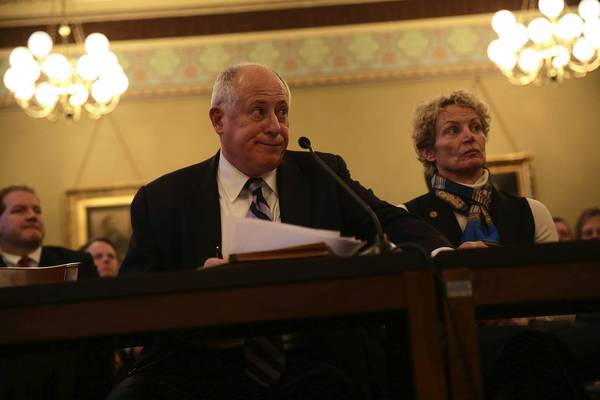
Pat Quinn, Elaine Nekritz
The Illinois legislature's lame-duck session ended without any pension solutions, despite a last-minute attempt by Pat Quinn to set up a commission to come up with fixes, the conclusions of which would be binding unless a majority shot them down. This might not be a big deal, at least in the very short term—nothing the legislature did would actually kick in until June, and anything the legislature did would likely be subject to a constitutional challenge. They couldn't fix the problem; at best, they could have started the process.
The main barrier seems to be: what's most likely to survive a constitutional challenge? Here's how it breaks down.
On Tuesday, a comprehensive House pension plan proposed by Rep. Elaine Nekritz, D-Northbrook, and backed by House Republican leader Tom Cross of Oswego, failed to gain traction. The plan would have frozen cost-of-living increases for retirees for six years, limit the amount of salary upon which pensions are based and forced workers to pay more for their retirement.
This is pretty cut and dry. Nekritz's bill would cut promised benefits. This is a no-go in the constitution: "Membership in any pension or retirement system of the State, any unit of local government or school district, or any agency or instrumentality thereof, shall be an enforceable contractual relationship, the benefits of which shall not be diminished or impaired."
That's not to say there aren't legal arguments that could supersede this; the state could make the case that the pension funds are doomed, and either way the benefits will be diminished or impaired, either by being cut or by running out of money. Or they could argue that the state can't function and make the legal argument known as "Uncle." Is it over? It's a longshot, but was it over when the Germans bombed Pearl Harbor?
Anyway, Senate president John Cullerton's chief legal counsel, Eric Madiar, wrote a long and compelling analysis of why cutting pension benefits just won't survive a challenge, the title of which kind of answers its own question: "Is Welching On Public Pension Promises An Option for Illinois?" (PDF). So you can imagine why Cullerton has a different idea:
Cullerton stood behind his analysis that a Senate-passed plan for state workers and legislators, which traded access to state health care for altering pension benefits, was the only plan that would pass constitutional muster. That plan never faced a House vote.
“The Constitution says you can’t unilaterally pass a law taking away people’s pension benefits. You have to ask them to do it contractually,” Cullerton said. He maintains that some consideration must be given to workers for any reduction in their benefits. A plan that passed in the Senate would have asked employees to choose between their compounded-interest cost-of-living adjustments or state subsidized retiree health care. “Their bill unilaterally takes away people’s rights in exchange for nothing. That’s why it’s unconstitutional.”
Get it? The Nekritz bill is unconstitutional because it unilaterally reduces benefits. Cullerton's bill is constitutional because it gives employees a choice as to what benefits they want to be reduced.
It sounds a bit insane, but it's not, exactly. Cullerton's okay with passing a bill other than his own; he just wants his passed because he thinks it's more likely to pass a challenge than Nekritz's or any bill like hers. Illinois's pension laws (and the case law that surround them) are so tight—the most restrictive in the nation, essentially—that doing anything other than what the legislature's already done to pension benefits is almost certain to get challenged. So anything they do is going to sound, um, creative.
Cullerton could well be right: the courts could look at his bill and say, sure sure, that's not unilateral at all. Or they could look at Nekritz's bill and say "normally this wouldn't be okay, but benefits are going to get taken away when the funds go bust, there's your due consideration right there." This is why I'm not convinced it's cowardice: "Once again, the cowards surrendered, afraid of their shadows." Well, they're also afraid of the courts, and they should be. Rich Miller's more chill, pointing out that pols have stuck their necks out on bills, but "neither bill has majority support in the other chamber at the moment. What’s required here is leadership, and there’s precious little of that in these parts." Aside from finding new revenues, what the legislature has to do is agree on the best trajectory to best shoot the moon.
Update: Here's Madiar discussing pension reform and the Illinois constitution:
Photograph: Chicago Tribune


